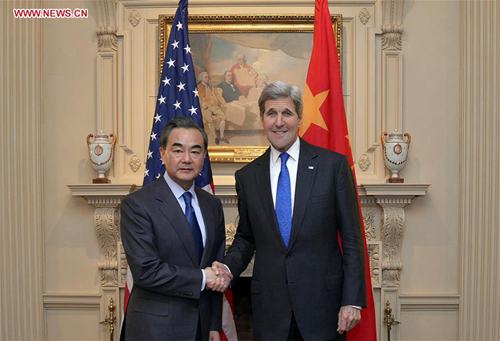

 |
Chinese Foreign Minister Wang Yi kicked off his official visit to the U.S. on Tuesday. The top item on his agenda is to exchange views with U.S. Secretary of State John Kerry on bilateral ties and issues of common concern, as well as to lay the groundwork for major interactions between both sides this year.
Wang’s U.S. visit carries great importance since both countries are currently facing complicated public opinion challenges.
Recently, Western media have been hyping up China’s deployment of a surface-to-air missile system on Yongxing Island, and then criticizing China for setting up a radar system on some islands and reefs in the Nansha Islands.
The Center for Strategic and International Studies (CSIS), a U.S. think tank, even added fuel to the fire by claiming that: “China is likely to use these facilities for effective sea and air surveillance and military defense,” which could affect the “operational landscape” of the South China Sea.
The U.S. Department of State also chimed in, slandering China for “escalating regional tensions.” The South China Sea issue seems to have become the biggest obstacle in China-U.S. relations.
Indeed, neither side can afford to be evasive when it comes to this issue. When the U.S. accused China of militarizing the South China Sea, Wang resolutely struck back, criticizing the U.S. for flexing its military muscle in the region by sending in warships and aircraft.
What everyone involved would do well to remember is that disputes, including the South China Sea issue, shouldn’t tarnish the big picture of China-U.S. relations. Bilateral ties shouldn’t be disrupted by regional issues.
First of all, communication provides a solid foundation for China-U.S. relations.
As the world’s largest and second largest economies, and as permanent members of the U.N. Security Council, the U.S. and China both play significant roles in global affairs. The China-U.S. relationship, therefore, is one of the most important bilateral relations in the world.
After meetings at Annenberg Estate, Yingtai and the White House, Chinese President Xi Jinping and U.S. President Barack Obama reached a consensus on the direction of bilateral relations. Bilateral dialogue is improving and official exchanges are increasing.
Kerry stated that the U.S. is looking forward to Xi’s attendance at the fourth Nuclear Security Summit. He also expressed U.S. support for China hosting the G20 summit in Hangzhou. This year will see more high-level exchanges between both sides.
Secondly, pragmatic cooperation injects impetus for the best possible China-U.S. relations, as it has already benefited both nations.
China has become the largest trading partner of the U.S. Both sides have also achieved results in climate change and other areas.
During his visit to the U.S., Wang proposed that both sides should focus more on bilateral cooperation instead of unilateral requests. The two sides also put forward multiple topics covering bilateral investment agreements and global issues.
China and the U.S. will further deepen their interdependence and expand their cooperation.
Thirdly, dispute management will ensure the stability of China-U.S. relations.
Both sides are devoted to enhancing mutual understanding. Wang is urging the U.S. to change its behavior regarding the South China Sea issue. Emphasizing his intention not to let the issue block bilateral cooperation, Kerry affirmed willingness on the part of the U.S. to launch positive interactions with China in the Asia-Pacific arena.
Wang and Kerry also furthered negotiation on the Korean Peninsula situation. This visit, which was the last opportunity for both sides to consult on the situation before the U.N. Security Council passed its resolution on North Korea, was an important measure to prevent the situation from getting out of control.
The core principle that guides China-U.S. ties is contingent upon building a new model of international relations. Both sides should uphold the principles of non-conflict and non-confrontation, and avoid the Thucydides Trap.
Through mutual respect, both sides can properly handle disputes. As China suggested, both countries should look at the future with binoculars, instead of exaggerating problems with a microscope.
(This article is translated and edited from 不能让分歧“绑架”中美关系 Source: People's Daily Overseas Edition. The author is an expert on international studies.)
>>>Related:
US, China 'agree on' DPRK sanctions
The United States and China have agreed on a proposed UN resolution on the Democratic People's Republic of Korea and will not accept Pyongyang as a nuclear weapons state, the White House and United Nations diplomats said on Wednesday.
 Engineer troop builds bridge in real combat conditions
Engineer troop builds bridge in real combat conditions You can urinate in public in Chongqing
You can urinate in public in Chongqing Rice terrace scenery in southwest China's Yunnan
Rice terrace scenery in southwest China's Yunnan 2016 Miss Chinatown USA pageant held in San Francisco
2016 Miss Chinatown USA pageant held in San Francisco Ancient pagodas across China
Ancient pagodas across China Wedding dress show up in the air
Wedding dress show up in the air Candidates perform in 2nd examination at Beijing Film Academy
Candidates perform in 2nd examination at Beijing Film Academy Russian photographer brings fairytales to life
Russian photographer brings fairytales to life Chinese beauties, foreign models meet in Chengdu
Chinese beauties, foreign models meet in Chengdu Top 20 hottest women in the world in 2014
Top 20 hottest women in the world in 2014 Top 10 hardest languages to learn
Top 10 hardest languages to learn 10 Chinese female stars with most beautiful faces
10 Chinese female stars with most beautiful faces China’s Top 10 Unique Bridges, Highways and Roads
China’s Top 10 Unique Bridges, Highways and Roads Chain security dilemma shadows Northeast Asia
Chain security dilemma shadows Northeast Asia Roads widen as compound gates come down
Roads widen as compound gates come down Chinese students in US get first taste of demonstrations
Chinese students in US get first taste of demonstrations Master users school foreigners on how to use pics and gifs
Master users school foreigners on how to use pics and gifs Day|Week